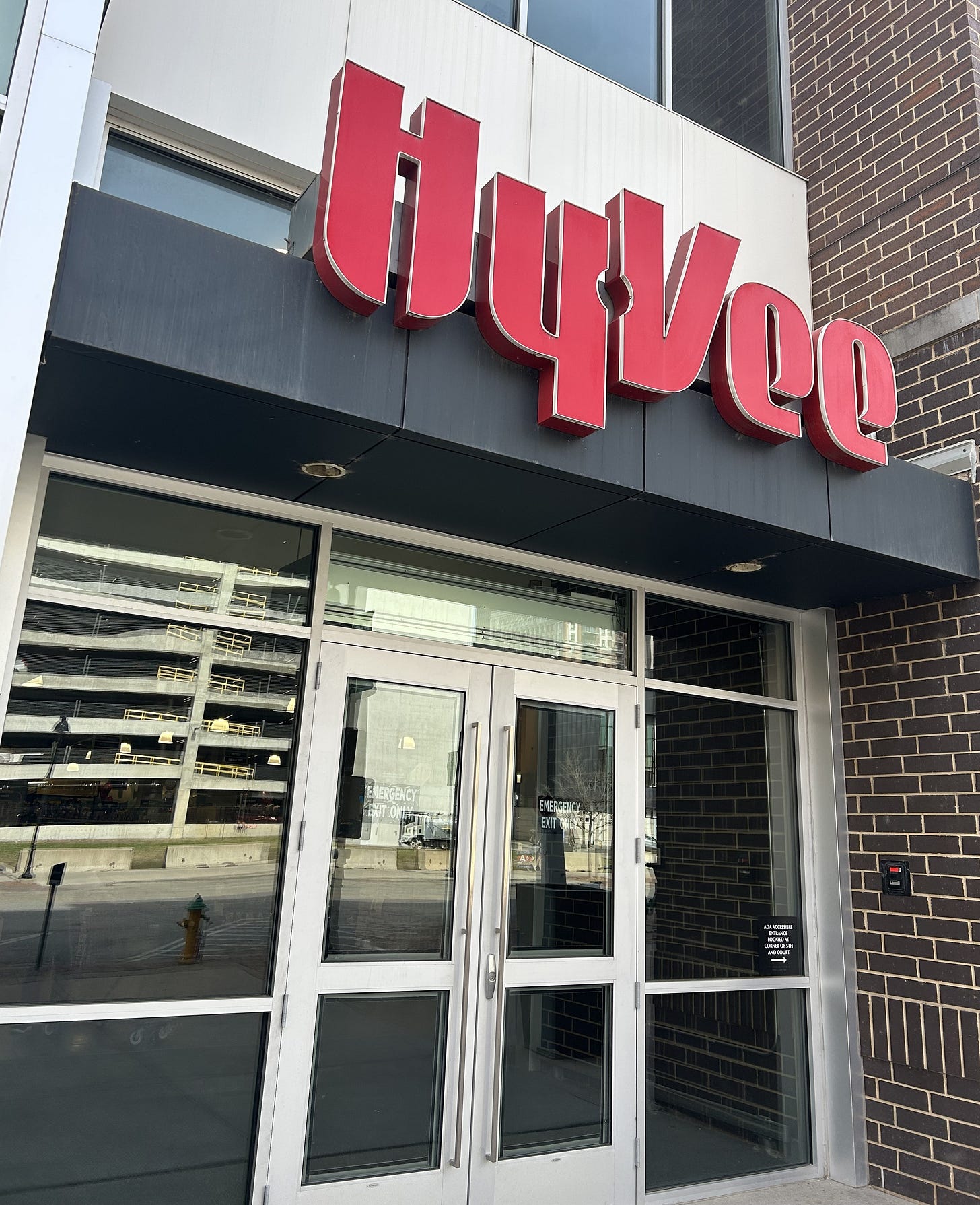The impact of shoplifting frustrates and annoys me.
The Hy-Vee across from the Polk County Court House closed all but one of its entrances this year, citing theft and loitering. (It recently opened another entrance but keeps the main one on Court Avenue shuttered.) Shopping at pharmacies and retailers in bigger cities often requires finding a worker to unlock merchandise. I worry that already struggling downtowns will become depleted of stores, shoppers, and vibrancy.

In the last few years, videos of smash-and-grab thefts have gone viral, and major big-box stores shut down locations, blaming organized retail crime. Shoplifting symbolized cultural chaos, even if violent crime rates actually decreased during the pandemic.
Thankfully, those dramatic episodes remain rare in Iowa. But shoplifting cases keep climbing.
In Polk County, 719 defendants were charged and/or convicted of 5th-degree theft in 2024. That’s a 33% increase over 2023, and 62% over 2022. This follows national trends: Retailers reported a 93% increase in the average number of shoplifting incidents per year in 2023 vs. 2019, according to a report by the National Retail Foundation.
Most of those Theft 5th cases involved shoplifting. A person who steals property or services valued at no more than $300 can be charged with Theft 5th, a simple misdemeanor.
What the shoplifters say
Why the increase? While it’s hard to pinpoint a single reason, we know what defendants tell us.
I recently wrote about restorative dialogues, conversations aimed promoting accountability, helping repair the harm done to crime victims and communities, and giving offenders a second chance. Mediators and volunteers have held dozens of conversations with defendants charged with Theft 5th in the last year and a half.
As you might expect, offenders often talk about financial need. “They say in the past they could sort of squeak by and now it’s no longer possible. They steal or do without,” said Ann Rezarch, a mediator. “Making ends meet is increasingly hard for people.”
Some say the incident was an accident, blaming the self-checkout counters. Unintentional or not, theft in the self-checkout is common. “Skip scanning” is too much of a temptation.
Less frequently, we hear from people who steal for psychological reasons. Ann recently talked to a well-educated professional and family man who admitted regularly shoplifting trading cards. “He said it makes him feel powerful and larger than life, untouchable. So he does it over and over,” she said. He’s working with a therapist to deal with his compulsion.
“I believe many more people can’t stop. It’s a close cousin to gambling. It’s a similar risk/reward activity,” Ann said.
Should laws change?
The traditional response to increases in crime is harsher punishments. In November, California voters approved Prop 36, The Homelessness, Drug Addiction, and Theft Reduction Act. Among other things, the law allows prosecutors to charge anyone convicted of a third theft with a felony, and the defendant can be sentenced to jail for up to three years, no matter the value of the stolen property.
In 2024, Iowa Gov. Kim Reynolds followed other states in signing a law that targets organized retail theft.
The law permits such a charge if someone engages in a “pattern of retail theft” (defined as acts committed or directed by a person on at least two separate occasions in the preceding six months) and the person sells or intends to sell the stolen retail merchandise. The penalties depend on the value of merchandise stolen, and they range from a serious misdemeanor to a Class C felony, punishable by up to 10 years in prison and a fine between $1,000 and $10,000. In Polk County, three people have been charged with organized retail theft since the law went into effect last year.
This is an important tool for prosecutors. But it doesn’t necessarily address the increase in Theft 5th charges we have seen. And enacting tougher laws raises important questions, such as: Would increasing fines deter financially strapped and desperate people? Is it cost-effective to fill up our jails with non-violent shoplifters?
Retailers respond
Citing big losses, retailers have increased security, improved technology, and taken other measures to prevent and crack down on theft – all while trying to avoid driving off law-abiding customers. Target has deployed more video surveillance and plain-clothes staff to watch customers. Walmart has a sophisticated loss-prevention system and detains suspected shoplifters and in most cases, calls police. Last year, Walmart was the victim in more than 200 cases prosecuted by the Polk County Attorney’s Office; no other retailer was even close.
I worry about the impact of zero-tolerance policies. Sometimes, Theft 5th arrests raise my eyebrows. In one recent case, Quik Trip security detained a woman who walked out of a store after filling her cup with ice. The value: 42 cents. The defendant said store clerks often let her take ice for free, but on this day, the clerk asked her to pay, and the woman said she was going to her car for change when the security guard stopped her.
Any criminal conviction can have lasting ramifications for defendants’ employment, housing, and educational prospects. That’s one reason law enforcement and prosecution agencies offer second chances, through diversion programs or deferred judgments.
The Polk County Attorney’s Office started an Alternatives diversion program in 2024 for simple misdemeanors such as Theft 5th, public intoxication, criminal mischief, and other non-violent offenses.
In the first nine months of Alternatives, 79 people had their Theft 5th charges dismissed after completing the program, which participating in a restorative dialogue with a community volunteer. Of those 79, three have had a new criminal charge: Two were charged again with theft and one with marijuana possession.1
Understanding the Impact
As you might have guessed, I believe that conversations can make a difference with some offenders. In our restorative dialogues, mediators and volunteers talk about the impact of shoplifting – not only on retailers, but also on all of us. Rampant retail theft can lead to higher prices and locked-up merchandise and turn neighborhoods into retail deserts, we say. But that’s not all: When people see someone walk out without paying, they fear society is becoming more lawless and unsafe. Some offenders respond that they’ve never thought of it that way.
Ann shared a story – not from mediating a restorative dialogue, but from having a conversation with a long-time acquaintance in her 50s. I will let her tell the story:
I knew she stole in her youth to mid 30s. I never talked with her about why. … This morning I told her I am interested in shoplifting and what causes it and what makes it stop. She offered her story. …
She stole connected to “rebellion.” She was somewhat combative and stealing was sticking it to the man. She would only steal from corporate stores and never a small business. She was taking her share back from the bad guys. She was a skilled thief and very rarely got caught -- but on occasion she did.
No consequences were enough to impact her. She lost at least one job over it. She did community service and informal probation. She had fines or court costs to pay. She didn’t stop.
One day she was riding on a bus. A man was in the seat across the aisle from her and he was talking to the bus driver. He was talking about how shoplifting affects store employees and the public. She described his conversation almost as if he was conducting a [restorative dialogue]. It was all about impact.
She felt an indescribable spiritual presence sort of spark between them and surge through her. She said that human impact had never occurred to her. She would never want to be a part of harming people, and she never stole again.
How does 3.8% compare? While the Alternatives program is new and needs more time to judge its effectiveness, one possible comparison is the rate of re-offense for defendants after completing probation: 7-9%, according to the Iowa Department of Corrections.
I’m thrilled to be part of the Iowa Writers’ Collaborative. Check out the lineup of writers and consider subscribing.





I have family in Cedar Rapids, and they have commented on the closing of the HyVee and how awful it is for that neighborhood. I didn't even consider that shoplifting would contribute to the closing. I'm a big proponent of 15-minute city neighborhoods, but trying to live anywhere near downtown CR means being in a food desert.
That's one thing I've loved about visiting downtown Des Moines. That Hy-Vee makes such a difference to the vitality of that DM neighborhood; I'm sorry they've had to crack down on the available entrances to that store.
As you pointed out, many shoplifters do it out of desperation and need. HyVee’s response in Cedar Rapids was to close their store down in a neighborhood that depended on it. So the whole neighborhood suffers the blame as a result.